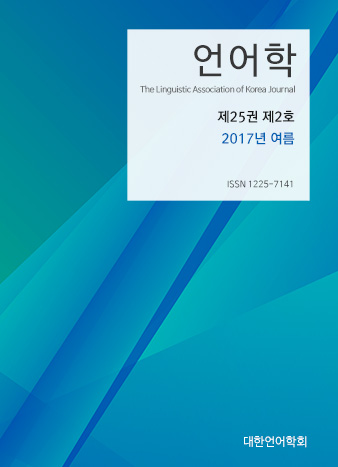대한언어학회 전자저널
25권 2호 (2017년 6월)
- 한국어의 주어 인상 구문 ‘—것 같다’: 존대 일치 현상에 관한 수용성 판단을 중심으로
-
최진선
Pages : 143-160
Abstract
Choe, Jinsun. (2017). Subject-to-subject raising in Korean: Evidence from honorific agreement. The Linguistic Association of Korea Journal, 25(2), 143-160. This study aims to investigate the availability of subject-to-subject raising movement in the -kes kathta construction by making use of the subject honorification properties in Korean. A total of 107 Korean-speaking adults participated in a judgment task where they were asked to rate the acceptability of various sentences, including -kes kathta constructions with or without the honorific marker -si-. As expected, participants were most likely to accept sentences in which the use of -si- is triggered by the honorific subject noun phrase within the same clause. However, they also showed a tendency to accept the use of -si- on the matrix predicate -kathta, even when there seems to be no (honorific) grammatical subject in the matrix clause, suggesting that the honorific marker agrees with the honorific subject that has raised from the embedded clause to the matrix clause. Thus, these findings point to the possibility of raising movement in Korean, indicating that the embedded subject is able to move out of the clause to the matrix subject position to agree with the honorific marker on the matrix predicate.
Keywords
# 주어에서-주어로의 인상 구문(subject-to-subject raising) # 인상 구문(raising constructions) # 존대 일치(honorific agreement) # 수용성 판단(acceptability judgment)
References
- 김용하·엄홍준. (2010). PRO에 대한 이동 분석과 한국어의 주어 올리기 구문. 현대문법연구, 60, 21-36.
- 엄홍준. (2010a). 한국어에서의 논항 이동과 pro. 현대문법연구, 59, 67-88.
- 엄홍준. (2010b). 재현성과 복사 인상. 언어학, 18, 109-124.
- 엄홍준·김용하. (2009). 주어 인상 구문과 예외적인 격 표시 구문에 대한 비교언어학적 고찰. 언어, 34, 583-602.
- 이정식. (2010). 순행, 역행 상승: 국어 ‘것’ 내부분열문. 언어연구, 25(4), 775-794.
- 최진선. (2016). 한국어의 주어 인상에 관한 실험적 연구. 언어연구, 32(1), 161-178.
- Brown, L. (2011). Korean honorifics and politeness in second language learning. Amsterdam/Philadelphia: John Benjamins.
- Brown, L. (2015). Honorifics and Politeness. In L. Brown & J. Yeon (Eds.), The handbook of Korean linguistics (pp. 303-319). Malden, MA: Wiley-Blackwell.
- Choe, H.-S. (1988). Restructuring parameters and complex predicates. Unpublished doctoral dissertation, MIT, Boston, MA.
- Choe, J.-W. (2004). Obligatory honorification and the honorific feature. Studies in Generative Grammar, 14(4), 545-559.
- Choi, Y.-S. (1988). A study of ascension constructions in Korean. Unpublished doctoral dissertation, University of Hawaii, Honolulu, HI.
- Chomsky, N. (1981). Lectures on government and binding. Dordrecht: Foris.
- Han, C.-H., Lidz, J., & Musolino, J. (2007). V-raising and grammar competition in Korean. Evidence from negation and quantifier scope. Linguistic Inquiry, 38(1), 1-47.
- Hong, S. (2009). Sentential subjects, subjectless constructions, and phasehood. Studies in Generative Grammar, 19(3), 373-397.
- Kang, M.-Y. (1988). Topics in Korean syntax: Phrase structure, variable binding and movement. Unpublished doctoral dissertation, MIT, Boston, MA.
- Kim, D., & Kim, Y.-H. (2003). Korean ECM constructions and the theory of phase. Studies in Modern Grammar, 33, 47-77.
- Kim, J.-B., & Sells, P. (2007). Korean honorification: A kind of expressive meaning. Journal of East Asian Linguistics, 16(4), 303-336.
- Koopman, H. (2005). Korean (and Japanese) morphology from a syntactic perspective. Linguistic Inquiry, 36(4), 601-633.
- Lee, H. (2007). A raising-to-object analysis of Korean ECM constructions. Studies in Generative Grammar, 17, 363-398.
- Lim, D. (2000). The grammar of the Korean ending si. Seoul: Taehaksa.
- O’Grady, W. (1991). Case in Korean ‘raising constructions’. Language Research, 27, 359-373.
- Postal, P. (1974). On raising: one rule of English grammar and its theoretical implications. Cambridge, MA: MIT Press.
- Rosenbaum, P. (1967). The grammar of English predicate complement constructions. Cambridge, MA: MIT Press.
- Sells, P., & Kim, J.-B. (2006). Honorification in Korean as expressive meaning. Korean Linguistics, 13(1), 167-195.
- Sohn, H.-M. (1999). The Korean language. Cambridge, UK: Cambridge University Press.
- Yeon, J., & Brown, L. (2011). Korean: A comprehensive grammar. London/New York: Routledge.
- Yoon, J.-H. (2007). Raising of major arguments in Korean and Japanese. Natural Language and Linguistic Theory, 25(3), 615-663.
- Yoon, J.-M. (1989). ECM and multiple subject constructions in Korean. Harvard Studies in Korean Linguistics, 3, 369-382. Seoul: Hanshin.
- Yun, S. (1993). Honorific agreement. Unpublished doctoral dissertation, University of Hawaii, Honolulu, HI.
